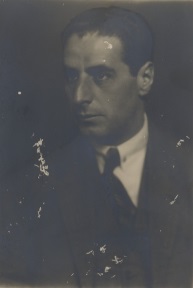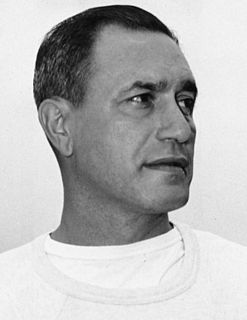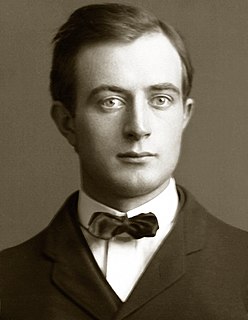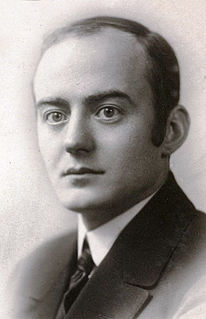
Sir Ralph Norman Angell was an English Nobel Peace Prize winner. He was a lecturer, journalist, author and Member of Parliament for the Labour Party.

Ernst Toch was an Austrian composer of classical music and film scores. He sought throughout his life to introduce new approaches to music.

Ernest Alonzo Nevers, sometimes known by the nickname "Big Dog", was an American football and baseball player and football coach. Widely regarded as one of the best football players in the first half of the 20th century, he played as a fullback and was a triple-threat man known for his talents in running, passing, and kicking. He was inducted with the inaugural classes of inductees into both the College Football Hall of Fame in 1951 and the Pro Football Hall of Fame in 1963. He was also named in 1969 to the NFL 1920s All-Decade Team.

Edward Verrall Lucas, CH was an English humorist, essayist, playwright, biographer, publisher, poet, novelist, short story writer and editor.
Henry Noel Brailsford was the most prolific British left-wing journalist of the first half of the 20th century. A founding member of the Men's League for Women's Suffrage in 1907, he resigned from his job at The Daily News in 1909 when it supported the force-feeding of suffragettes on hunger strike.

Kurt Gerron was a German Jewish actor and film director.

Henry Major Tomlinson was a British writer and journalist. He was known for anti-war and travel writing, novels and short stories, especially of life at sea. He was born and died in London.

Benjamin Friedman was an American football player and coach, and athletic administrator.

Daniel Earle McGugin was an American football player and coach, as well as a lawyer. He served as the head football coach at Vanderbilt University in Nashville, Tennessee from 1904 to 1917 and again from 1919 to 1934, compiling a record of 197–55–19. He is the winningest head coach in the history of the university. McGugin was inducted into the College Football Hall of Fame as a coach in 1951 as part of its inaugural class. He was the brother-in-law of University of Michigan coach Fielding H. Yost.

Henry St. Clair Whitehead was an Episcopal minister and author of horror fiction and fantasy

Ralph Simpson Kuykendall was an American historian who served as the trustee and secretary of the Hawaiian Historical Society from 1922 to 1932. Kuykendall also served as professor of history at the University of Hawaii at Manoa. He is most noted as a historian of the Hawaiian Islands, South Pacific, and Pacific Northwest.

Douglas Z. Doty was an American screenwriter and editor.

Mary Josephine Dunn was an American stage and film actress of the 1920s and 1930s.

Frederic Antes Godcharles was a Pennsylvania politician, historian and author, who served as soldier and as director of the State Library of Pennsylvania and State Museum of Pennsylvania.

France Bevk was a Slovene writer, poet and translator. He also wrote under the pseudonym Pavle Sedmak.

Västerbottens-Kuriren is a Swedish newspaper founded in 1900. It is published in Umeå, Västerbotten, Sweden. The newspaper covers regional news from the region Västerbotten, with a special interest in the home town Umeå, in combination with national news and international news.

Mineichirō Adachi was a Japanese legal expert and President of the Permanent Court of International Justice at the Hague from 1931 until 1934.
Edward Henry "Ted" Reeve was a multi-sport Canadian athlete and sports journalist. He was on two Grey Cup winning teams as a football player, a Mann Cup championship as a lacrosse player and three Yates Cup championships as a coach for Queen's University. He is a member of Canada's Sports Hall of Fame. As an athlete Reeve was noted for determination and inspiring team-mates. He acquired the nickname "The Moaner" in later years after one of the characters in his newspaper columns, Moaner McGruffery.

McClure Newspaper Syndicate, the first American newspaper syndicate, introduced many American and British writers to the masses. Launched in 1884 by publisher Samuel S. McClure, it was the first successful company of its kind. It turned the marketing of comic strips, columns, book serials and other editorial matter into a large industry, and a century later, 300 syndicates were distributing 10,000 features with combined sales of $100 million a year.

Bjarne Jullum was a Norwegian journalist, cooperativist and politician for the Labour and Communist parties.























